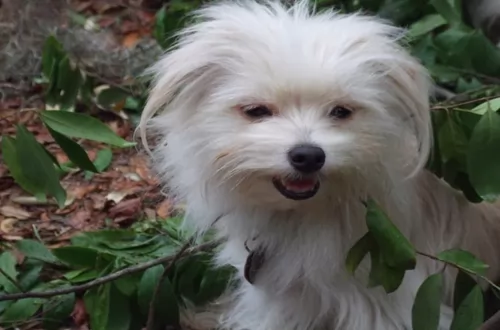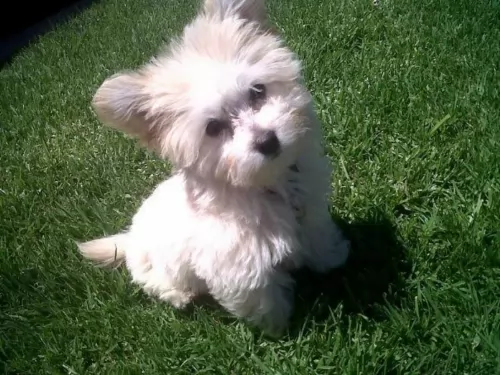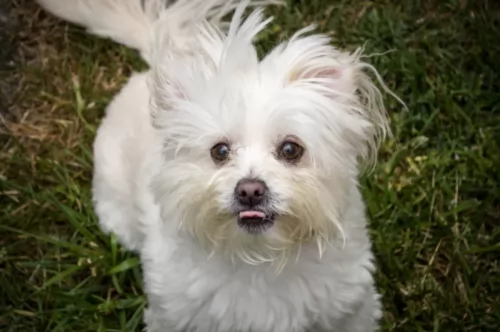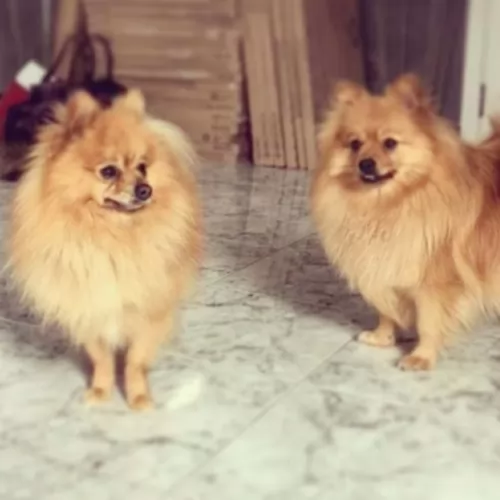 Petzlover
Petzlover Galgo Espanol is originated from Spain but Malti-Pom is originated from United States. Galgo Espanol may grow 39 cm / 16 inches higher than Malti-Pom. Galgo Espanol may weigh 24 kg / 53 pounds more than Malti-Pom. Both Galgo Espanol and Malti-Pom has same life span. Galgo Espanol may have more litter size than Malti-Pom. Galgo Espanol requires Low Maintenance. But Malti-Pom requires Moderate Maintenance
Galgo Espanol is originated from Spain but Malti-Pom is originated from United States. Galgo Espanol may grow 39 cm / 16 inches higher than Malti-Pom. Galgo Espanol may weigh 24 kg / 53 pounds more than Malti-Pom. Both Galgo Espanol and Malti-Pom has same life span. Galgo Espanol may have more litter size than Malti-Pom. Galgo Espanol requires Low Maintenance. But Malti-Pom requires Moderate Maintenance
 Galgo Espanol means Spanish with galgo meaning greyhound, thus a Spanish Greyhound. This breed is ancient with their roots in perhaps the English greyhound and others in the sighthound family. They are much like the greyhound in that they are laid back, calm, gentle and quiet, unless they are competing on the local track. Like the greyhound they are shy and reserved; great with kids and other pets. And of course, they love cats.
Galgo Espanol means Spanish with galgo meaning greyhound, thus a Spanish Greyhound. This breed is ancient with their roots in perhaps the English greyhound and others in the sighthound family. They are much like the greyhound in that they are laid back, calm, gentle and quiet, unless they are competing on the local track. Like the greyhound they are shy and reserved; great with kids and other pets. And of course, they love cats.
There are dogs like the Galgo referred to in writing by the ancient Celts and Romans. One author, Arrian, had his own Galgos and used them when hunting. The breed flourished in the second half of the Middle Ages in Spain and well into the 8th century. When the Christians regained control of the Iberian Peninsula, they did away with the hunter old forms of hunting and introduced a new form with hounds that made the Galgo the pride of the aristocracy and not in the homes of the ordinary people. Arrian claim to two types of dogs, the smooth and rough coated.
Muslim and Chrisitan Kings kept Galgo Espanols. In all probability the Saluke and Galgo were crossbred at this time. It was illegal to kill a Galgo and in 1081, the Mayor of Cartuario of Slonza left his Galgo in his will to Diego Citid. Dogs seen in painting from the 12th century look just like dogs of this breed who can be seen today.
It is believed that when the Galgo was developed, it was in the midsection of Spain or the Castillian plains. They ruled the interior of the country while the bloodhound ruled the exterior. The 18th and 19th centuries saw very little change in the breed. However, in the 20th century, there was cross breeding with the English greyhound that produced a leaner, faster and powerful track racing dog. The results was a faster dog without the long distance stamina of the pure Galgo. For this reason, the breeders returned to breeding the pure professional racing dog.
The sport of racing the Galgo earns Spain around sixty million dollars per year. They train anywhere from three to four thousand of the Galgos every year for Open Field Coursing Championships. Still, there no longer is any cross breeding between the Greyhound and the Galgo. The current coursing programs feature a hare that is much hardier and difficult to pursue so the stamina of the old Galgo Espanol is desired. In Castile, where these games are played, the landscape is open with large fields that requires that the hare travels far greater distances. This means that the stamina of the original Galgo Espanol is needed.
When not racing the Galgos have become great house pets. They have a reputation as gentle dogs that are docile and quiet, with good health. This reputation is well earned. They are also successful show dogs in Europe much more than the states. This is perhaps because they are really rare outside of Spain. They are not recognized by the United Kennel Club nor the American Kennel Club.
 The sweet little Malti Pom is a dog which comes from crossing two purebreds – the Maltese Poodle and the Pomeranian.
The sweet little Malti Pom is a dog which comes from crossing two purebreds – the Maltese Poodle and the Pomeranian.
The appearance of this dog will vary according to how much of each breed is in the dog. The exact origins of the Maltipom breed are unknown but many new dog breeds have originated in the United States.
The Maltipom is also not recognized by the AKC because it’s a hybrid of two pure breeds and not looked upon as a new breed. It is however recognized by the American Canine Hybrid Club.
 Obviously the Galgos looks a lot like the Greyhound, but in some very important ways they are very different. The rear of the Galgos is higher than the front and their muscle are flatter. They are built for endurance while the Greyhound is built for speed. The Galgos is a lighter, smaller dog with larger ear on a long head. They have long tails and their chests are not deep like the Greyhounds.
Obviously the Galgos looks a lot like the Greyhound, but in some very important ways they are very different. The rear of the Galgos is higher than the front and their muscle are flatter. They are built for endurance while the Greyhound is built for speed. The Galgos is a lighter, smaller dog with larger ear on a long head. They have long tails and their chests are not deep like the Greyhounds.
The Galgo comes in smooth and rough coats and a variety of colors. The rough coat protects dogs that are in climates colder than the ones in Spain and also keeps them from injuring their skin while running. The colors include brindle, black, golden, toasted, cinnamon, yellow, red, white, white with patches, or any color as long as they have a white forehead and muzzle.
 The Malti-Pom is a crossbreed, so pinpointing his exact size can be somewhat difficult, but you can expect him to be in the region of 20 to 28cm and weigh in at about 2 to 5kg.
The Malti-Pom is a crossbreed, so pinpointing his exact size can be somewhat difficult, but you can expect him to be in the region of 20 to 28cm and weigh in at about 2 to 5kg.
Both the Maltese and the Pomeranian are both toy dogs, so the Malti-Pom is almost sure to be a small dog. His appearance will also vary depending on which side he inherits most of his looks from. Generally though, he has a long coat of straight, soft hair.
He is a low shedder and with the poodle side of him he is looked upon as being hypoallergenic. The coat can be cream, apricot, white or black as well as a combination of these colors.
This is such a friendly, amicable little dog. He is good with children and can get on well with other pets in the home.Children should be taught to be gentle with any dog, but particularly a small one like this.
The Malti-pom is extremely loyal and affectionate with its family members, but ends to form a special bond with one member of its family.
These little dogs are generally reserved with strangers. They are well-behaved, sociable and can mix well with children and pets in the home. These toy dogs are clever so you won't battle with him with training and socialization.
Although the Maltipom looks cute and is an amicable dog, he can bark quite aggressively when he encounters strangers who he believes might harm his family. He makes a good watchdog.
 They are good with children, but you need to be careful no one gets knocked down or hurt.
They are good with children, but you need to be careful no one gets knocked down or hurt.
Stamina for running and a good record in lure coursing.
Though they can be couch potatoes like greyhounds they are better off with a fenced yard and not an apartment.
They are smart and can learn anything you want to teach them if you can keep their attention.
 Because your Malti-Pom comes from two different dog breeds, you can’t really say what kind of personality traits he will inherit.
Because your Malti-Pom comes from two different dog breeds, you can’t really say what kind of personality traits he will inherit.
Both the Maltese and the Pom are small lap-type dogs who are essentially companion dogs. You can be sure your Malti-pom is going to be cute, social, energetic, vibrant and loving. They are able to adapt well to life in the city or the countryside and a nice walk every day will go down well in terms of exercise. It give your pet a chance to get outdoors and to sniff new scents.
With the Maltese and the Pom being the two parents of this dog breed, you can be sure that you’re going to have a splendid little pet who is guaranteed to bring lots of smiles into your home from his jovial, entertaining ways
 Being a large dog, the Galgo Espanol would normally face a high probability of hip dysplasia. Fortunately for the breed this is not true. In this respect their lightness of weight, their history as a working dog and their anatomy have protected them from it. They are however susceptible to other issues.
Being a large dog, the Galgo Espanol would normally face a high probability of hip dysplasia. Fortunately for the breed this is not true. In this respect their lightness of weight, their history as a working dog and their anatomy have protected them from it. They are however susceptible to other issues.
Malignant tumors that quickly spread throughout the body. Life threatening.
As a sighthound, the Galgo Espanol is prone to have issues anytime with anesthetics. They don’t metabolize the anesthetics like other dogs do. They will take longer to revive, and they are susceptible to hypothermia while under an aesthetic.
While running, they are prone to injuries
 Fortunately, the Maltipom is considered to be a healthy dog, and he can live with you for a good number of years with good care. The Maltipom could develop heart issues.
Fortunately, the Maltipom is considered to be a healthy dog, and he can live with you for a good number of years with good care. The Maltipom could develop heart issues.
Heart disease is fairly common in dogs and some symptoms will include a cough, loss of appetite and he might tire easily. One of the common types of heart disease is degenerative valvular disease, where the heart valves fail.
It is believed that degenerative valve disease is a heart disease which accounts for about 75% of all heart disease in dogs. Diagnosing heart disease requires a number of different testing methods.
 Feed your puppy a high quality dry food made for large breed dogs. Feed 3 meals a day 2.5 to 3 cups total for the day.
Feed your puppy a high quality dry food made for large breed dogs. Feed 3 meals a day 2.5 to 3 cups total for the day.
Feed your adult Galgo a high quality dry food made for large breed dogs. Feed 2 meals a day but don’t overfeed Give 4-5 cups total for the day.
They have amazing stamina and good speed. Generally good health as a breed.
He can be a couch potato indoors and runs forever outdoors. He does need daily exercise and bedrest both. The best would be if you could sprint him every day or have a small yard he can play in. They excel of course at agility and lure coursing. Keep them on a leash because if they run you will never catch them. The American Sighthound Field Association presents lure coursing events that they are eligible for. They have exceled at show competition in Europe but are not well known in the U.S.
 The Maltipom is a tiny dog, and that’s an advantage actually as he isn’t going to cost you too much to feed. Half a cup of food in he morning and another in the evening will keep him satisfied.
The Maltipom is a tiny dog, and that’s an advantage actually as he isn’t going to cost you too much to feed. Half a cup of food in he morning and another in the evening will keep him satisfied.
If you give him commercially manufactured food, choose a high quality one specially made for small dogs. You can chop up cooked chicken, brown rice or pasta and some cooked vegetables finely and add this to his dry kibble from time to time as a tasty treat.
A tiny little bit of raw meat once in a while will also keep him healthy. Keep things simple – don’t try all sorts of weird foods with him as he can battle with digestive problems.
Groom your pet. Brush him at least twice a week. Check his eyes and ears for infection and remember to brush his teeth at least 2 or 3 times a week with special canine toothbrush and toothpaste.
Make sure he is exercised. He'll love a walk each day.